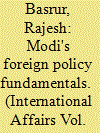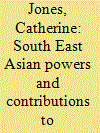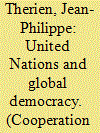|
|
|
Sort Order |
|
|
|
Items / Page
|
|
|
|
|
|
|
| Srl | Item |
| 1 |
ID:
167777


|
|
|
|
|
| Summary/Abstract |
The article attempts to trace the evolution of the Chinese school of international relations and the influence that Qin Yaqing’s “relational theory of world politics” arising in its depths and claiming universality has on the formation and implementation of the diplomatic strategy of China’s partner relations. The process constructivism and normative requirements—the recognition by partner states of the core national interests of the PRC—act as a theoretical pattern in the article.
|
|
|
|
|
|
|
|
|
|
|
|
|
|
|
|
| 2 |
ID:
153831


|
|
|
|
|
| Summary/Abstract |
The advent of Narendra Modi as prime minister has produced considerable debate about the direction that Indian foreign policy might take under his stewardship. While there are diverse ways in which one might assess Modi's foreign policy vis-à-vis the major powers, three overarching questions are of central importance. First, given his reputation as a staunch Hindu nationalist, to what extent do his ideological leanings influence Modi's foreign policy, especially with respect to the use of national power? Second, how is Indian policy towards the major powers designed? Are there signs of a classic balance of power approach drawing it towards the US and Japan, and against China? Finally, how is Indian foreign policy configured towards the objective of attaining higher status in the states system? Above all, is Modi significantly different from his predecessors? It is shown that there is no significant shift in the use of power arising from the ‘Hindu’ content in Modi's foreign policy; that his approach to the major powers reflects continuity (with some variations) by way of a focus on strategic partnerships; and that the quest for status is in line with the strategy pursued by previous prime ministers. In sum, there is no substantive change in the trajectory of Indian foreign policy and rising India's future direction is likely to remain both predictable and moderate.
|
|
|
|
|
|
|
|
|
|
|
|
|
|
|
|
| 3 |
ID:
145772


|
|
|
|
|
| Summary/Abstract |
This article investigates the notion of ‘lateralisms’ and how various modes of engagement (namely bilateralism, regionalism and multilateralism) relate to one another. It begins with a careful analysis of the evolution of ‘lateralisms’ and their (in)compatibility at the global level, building on the existing literature from multiple research disciplines. The second part of this article focuses specifically on the European Union's (EU's) foreign policy approach. The author puts forward two main hypotheses. First, the EU has performed a rebalancing act between bilateralism and regionalism/multilateralism over the last decade in favour of the former, notably through the deepening of its so-called ‘strategic partnerships’. Second, this enhanced bilateralism is not necessarily compatible with other ‘lateralisms’, as it can at times undermine regional integration processes or the building of an effective multilateral order. The author eventually formulates some recommendations to ensure that bilateral partnerships are geared towards the strengthening of the multilateral fabric which remains the EU's fundamental and long-term objective.
|
|
|
|
|
|
|
|
|
|
|
|
|
|
|
|
| 4 |
ID:
176228


|
|
|
|
|
| Summary/Abstract |
Regions are becoming increasingly central to both the implementation and claims to legitimacy of UN peacekeeping operations. In 2008, in the UN Secretary General published a report on the relationship between the UN and Regional Organisations (S/2008/186**), highlighting that UN-regional partnerships should develop to entail wider capacity building activities, define and refine the responsibilities of regions and the UN in both Chapter VIII and non-chapter VIII activities, and perform functions in support of disarmament and mediation. However, ten years after the UN Secretary General’s report and four years after the HIPPO report there is still an urgent need to understand how, and in response to what drivers, are UN peacekeeping operations changing? In this paper I argue that because of the UN’s approach to partnerships it excludes learning from the contributions of other global potential partners including ASEAN. As a result, although there are pathways that make it possible for such a transfer of knowledge and experience, but these are often blocked—or perhaps just obscured—by the practices within the UN; for example, the institutional stickiness around partnerships.
|
|
|
|
|
|
|
|
|
|
|
|
|
|
|
|
| 5 |
ID:
092876


|
|
|
|
|
| Publication |
2009.
|
| Summary/Abstract |
This article shows that the idea of global democracy has been a driving force in UN discourse and policies for the past two decades. In the first part, we use official rhetoric to explain that the promotion of global democracy by the UN rests on a particular set of values and beliefs. In an analysis that parallels the interpretation proposed by cosmopolitan democratic theorists, UN leaders argue that international governance must be democratized in order to reflect the recent reconfiguration of political forces. We then examine how UN ideas are put into practice through global public policies. Structured in line with the distinction between input- and output-based legitimacy, this second part demonstrates how UN policies foster greater participation by non-state actors in the organization's deliberations and operations. The article suggests that the UN is an effective intellectual actor. By promoting civil society's greater involvement in world politics, the discourse and policies of the UN have indeed succeeded in advancing the idea of a democracy 'without borders'
|
|
|
|
|
|
|
|
|
|
|
|
|
|
|
|
| 6 |
ID:
175152


|
|
|
|
|
| Summary/Abstract |
Canada’s Feminist International Assistance Policy, introduced in 2017, is an ambitious and forward-thinking policy focussed on gender equality and women’s empowerment. The emphasis on a feminist vision, however, raises questions about how feminism is defined and interpreted by Canada’s partners in the Global South. In this article, we examine the interpretations of feminism(s) and a feminist foreign policy from the perspective of NGO staff members in East and Southern Africa. The research involved interviews with 45 Global South partner country NGO staff members in three countries (Kenya, Uganda, and Malawi). We consider the partner organization reflections on Canada’s Feminist International Assistance Policy using a transnational feminist lens. Our findings provide insights into future considerations for Canada’s feminist foreign policy priorities, consultations, and programme design.
|
|
|
|
|
|
|
|
|
|
|
|
|
|
|
|
|
|
|
|
|